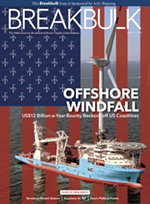Sep 07 | 2021
Cargoes Need Financial Protection. Period.

 By Margaret Vaughan
By Margaret VaughanI’ve never understood the reluctance on the part of some clients not to secure marine cargo insurance. Yes, it can get expensive, especially if your company ships a great deal, but the cost of a single loss can be somewhat catastrophic. Generally, when shippers are shaving costs, insurance is the first to get eliminated or severely modified. But not insuring shipments can be a costly mistake.
Working on a project for which the products being shipped were replacements for existing structures and central to the plant’s continuing operation, I brought up the subject of cargo insurance. I was told: “No. We don’t want it.” I asked if they were self-insured and they said “Yes.” “That’s great,” I replied, “what’s your deductible?” “US$56 million,” their transport and logistics guys answered. They were insured for catastrophic situations without looking at the catastrophe that might occur if the shipment were lost. And they knew it. “You’re preaching to the choir” was what they told me. The company wouldn’t even listen to their own T&L experts.
Many companies are under the impression that the Builder’s Risk Insurance they carry on a project will cover goods in transit for that project. It does but only if the goods are in transit from the point of origin directly to installation. They are not covered if they are stored in a warehouse for any period of time or if they are set in a yard to be modified before installation. But companies don’t know/understand/care about these issues. It’s a money thing, I get it. Unfortunately, it makes the jobs of those working on the transports more difficult and stressful.
Another thing that companies rarely consider is what their underwriter’s policy actually says, what it covers, and what conditions might change the coverage from an Institute Clause A to a Clause B, Clause C, or even invalidate it entirely. As an example, the marine cargo insurance policy at a former employer covered barge shipments. However, barge shipments with cargo valued at more than US$1 million needed to be surveyed prior to shipment by one of three specific survey companies. These were not our normal surveyors and their higher cost had not been calculated into our project.
I’ve always said that proper export packing by a qualified export packer is the cheapest insurance you can buy.
Properly blocking and bracing containers protects goods from damage that can occur during shifting or bouncing around during truck transport. Boxing goods before containerizing can save a company in a number of ways:
1) Goods have additional protection while in transit.
2) There is a significant decline in pilferage.
3) Goods are easier to move and store in warehouses decreasing labor costs on site.
4) It lessens the amount of times the goods are handled. And we all know that damage most often occurs during handling.
Since you carry insurance on your business, vehicle(s), house, life, spouse, children, it seems ridiculous not to carry it on the key components of your business. Just sayin’.
But I’m preaching to the choir.
Margaret J. Vaughan has more than 30 years’ experience in all facets of supply chain management. She has been a regular columnist with Breakbulk since late 2018. Sadly, she will step down at the end of the year, saying “it’s time to let someone else have a voice.” Her last submission will be in Issue 6 / 2021.
Image credit: Shutterstock
